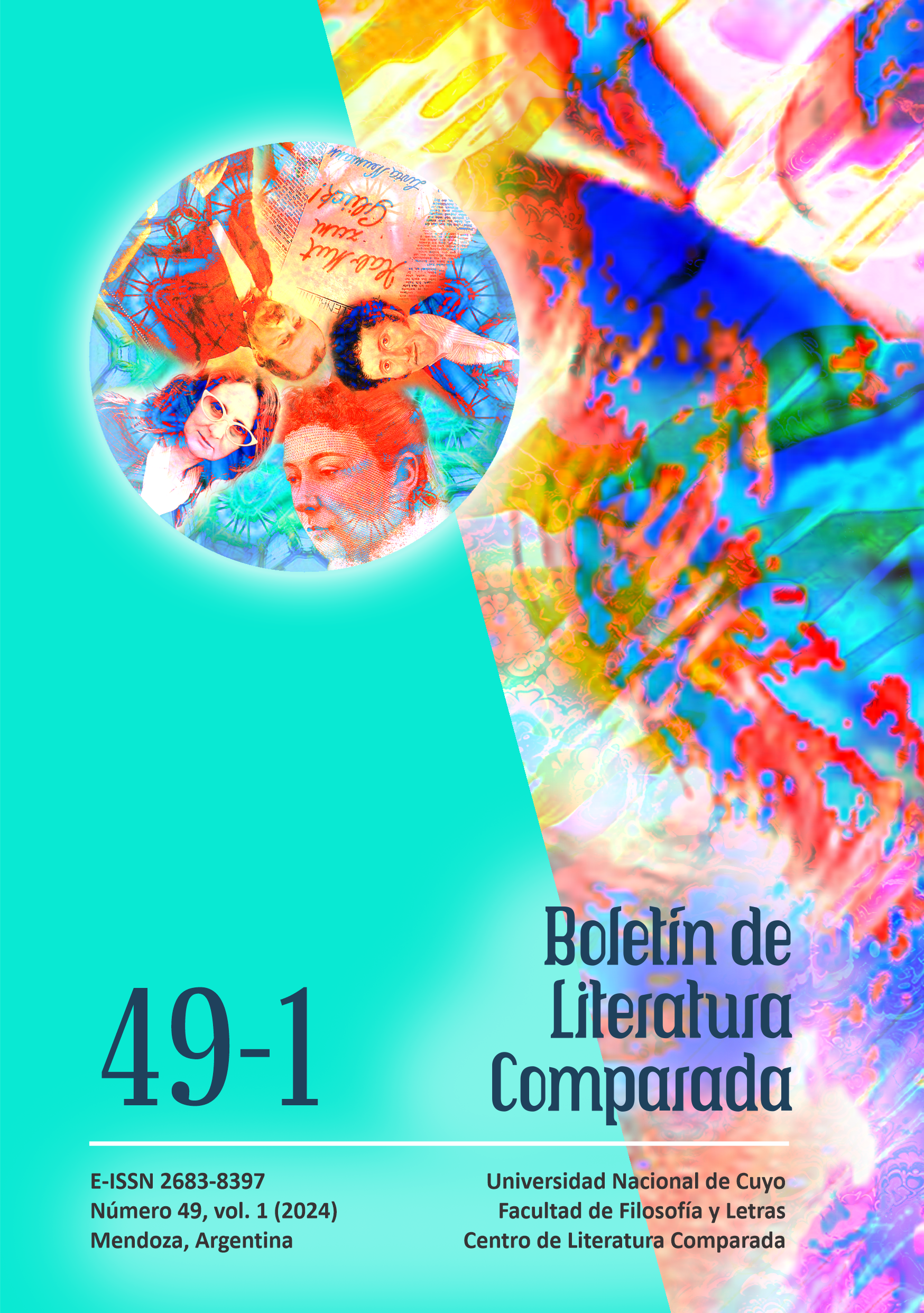Colonialidad y género: Relaciones entre Zama (1956) de Antonio Di Benedetto y Zama (2017) de Lucrecia Martel
DOI:
https://doi.org/10.48162/rev.54.032Palabras clave:
Zama, Lucrecia Martel, Antonio Di Benedetto, género, colonialidadResumen
En este artículo pondré en diálogo la novela Zama de Antonio Di Benedetto con su reescritura cinematográfica: Zama de Lucrecia Martel. Como punto de partida, tomo un interrogante de Rita Segato que se relaciona íntimamente con ciertas políticas cinematográficas de la adaptación de Martel y que debate cuáles son las formas en las que el arte contemporáneo –y sus trabajos e intervenciones en torno al género– pueden desarticular la colonialidad del poder. Creo que Zama busca respuestas a estos interrogantes. Para indagar en ello, observaré un cambio fundamental en el pasaje de novela a film: Martel elimina la primera persona, prescinde de Diego de Zama –varón heterosexual– como narrador protagonista. El fuerte “yo” de la novela deviene en el film en un colectivo de voces diverso y amplísimo: voces de mujeres, niños y niñas, indígenas, esclavos y esclavas. ¿Hacia qué conclusiones nos llevan estas políticas cinematográficas?
Citas
Amiot-Guillouet, Julie y Bloch-Robin, Marianne (2022). Introducción. Deconstruir la historia oficial. Zama de Lucrecia Martel. Pandora: Revue d’études hispaniques, (17), 7-12.
Brodersen, Diego (28 de septiembre de 2017). Zama: Lucrecia Martel golpea con un trip colonial y filosófico. La Nación. Recuperado el 10 de noviembre de 2023 de https://www.lanacion.com.ar/espectaculos/cine/zama-lucrecia-martel-golpea-con-un-trip-colonial-y-filosofico-nid2067302/
Cid, Adriana (2011). Pasajes de la literatura al cine: algunas reflexiones sobre la problemática de la transposición fílmica. Letras, (63-64). Recuperado el 10 de noviembre de 2023 de https://repositorio.uca.edu.ar/bitstream/123456789/3806/ 1/pasajes-literatura-cine-algunas-reflexiones.pdf
Cosin, Flor (27 de septiembre de 2017). Lucrecia Martel. No puedo avalar con mi película las fantasías violatorias. La Nación. Recuperado el 10 de octubre de 2023 de https://www.lanacion.com.ar/lifestyle/lucrecia-martel-no-puedo-avalar-con-mi-pelicula-las-fantasias-violatorias-nid2066908/
Deleuze, Gilles (1984). La imagen movimiento. Estudios sobre cine 1. Barcelona, Buenos Aires, México: Paidós.
De Lauretis, Teresa (1984). Alicia ya no. Feminismo, semiótica, cine. Valencia: Cátedra.
Di Benedetto, Antonio (1972). Zama. Barcelona: Biblioteca Universal Planeta.
Fernández Bravo, Álvaro y Dieleke, Edgardo (2021). Zama: heterocronía, voyeurismo y mundos posibles. La Fuga, (21). Recuperado el 10 de noviembre de 2023 de https://www.lafuga.cl/zama-heterocronia-voyeurismo-y-mundos-posibles/880
Galt, Rosalind (2019). Learning from a Llama, And Other Fishy Tales: Anticolonial Aesthetics in Lucrecia Martel’s Zama. The Cine-Files, (14). Recuperado el 10 de noviembre de 2023 de https://www.thecine-files.com/galt/
Martin, Deborah (2022). A kind of bliss, a closing eyelid, a tiny fainting spell': Zama and the lapse into colour. En Natalia Christofoletti Barrenha, Julia Kratje y Paul Merchant, (eds.) ReFocus: The Films of Lucrecia Martel (p. 165-178). Edinburgh: University Press.
Nuñez, Guillermo (13 de noviembre de 2017). Zama de nuevo. La tempestad. Recuperado el 10 de octubre de 2023 de https://www.latempestad.mx/zama-dibenedetto/
Oubiña, David. (2007). Estudio crítico sobre La ciénaga. Entrevista a Lucrecia Martel. Buenos Aires: Picnic Editorial.
Peña Ardid, Carmen (1992). Literatura y cine. Una aproximación comparativa. Madrid: Cátedra.
Romani, Federico (2017). “Zama. Lucrecia Martel.” Otra parte semanal. En línea. http://revistaotraparte.com/semanal/cine-y-tv/zama/
Sabouraud, Frédéric (2010). La adaptación. El cine necesita historias. Madrid: Paidós.
Saer, Juan José (1997).“Antonio Di Benedetto”. En: El concepto de ficción (p. 55-58). Buenos Aires: Ariel.
Salas, Hugo y Schwarzbock, Silvia. “El verano de nuestro descontento. Género y violencia en La ciénaga”. El amante (108). Marzo de 2001. Recuperado el 30 de mayo de 2024 de https://larabiacine.com/2023/05/19/el-verano-de-nuestro-descontento/
Segato, Rita (2021). Contrapedagogías de la crueldad. Buenos Aires: Prometeo.
Segato, Rita (2013). La crítica de la colonialidad en ocho ensayos y una antropología por demanda. Buenos Aires: Prometeo.
Stiletano, Santiago (5 de julio de 2020). Lucrecia Martel. ¿Leyeron la novela?, dijimos.
Es imposible filmarla en el desierto. La Nación. Recuperado el 1 de diciembre de 2023 de https://www.lanacion.com.ar/cultura/lucrecia-martel-leyeron-la-novela-dijimoses-imposible-filmarla-en-el-desierto-nid2388997/
Vélez Escallón, Byron. (2022). Todavía no: Zama, un criollo, un indio. Revista Zama, (14, 133-56).
Wolf, Sergio (2001). Cine/literatura. Ritos y pasajes. Buenos Aires: Paidós.
Zama. Dir. Lucrecia Martel. Cameo. 2017.
Descargas
Publicado
Cómo citar
Número
Sección
Licencia

Esta obra está bajo una licencia internacional Creative Commons Atribución-NoComercial-CompartirIgual 4.0.






















